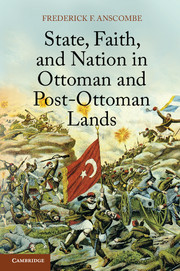Book contents
- Frontmatter
- Dedication
- Contents
- List of Maps and Images
- Acknowledgments
- Transliteration and Abbreviations
- Maps
- Introduction
- Part I The Ottoman Empire
- 1 State, Faith, Nation, and the Ottoman Empire
- 2 The Premodern Islamic State and Military Modernization
- 3 The Breaking of the Premodern Islamic State
- 4 The Reconstructed Muslim State
- 5 End of Empire
- Part II From Ottoman to Post-Ottoman States
- Part III Contemporary Post-Ottoman States
- Conclusion State, Faith, and Nation
- Bibliography
- Index
- References
1 - State, Faith, Nation, and the Ottoman Empire
Published online by Cambridge University Press: 05 June 2014
- Frontmatter
- Dedication
- Contents
- List of Maps and Images
- Acknowledgments
- Transliteration and Abbreviations
- Maps
- Introduction
- Part I The Ottoman Empire
- 1 State, Faith, Nation, and the Ottoman Empire
- 2 The Premodern Islamic State and Military Modernization
- 3 The Breaking of the Premodern Islamic State
- 4 The Reconstructed Muslim State
- 5 End of Empire
- Part II From Ottoman to Post-Ottoman States
- Part III Contemporary Post-Ottoman States
- Conclusion State, Faith, and Nation
- Bibliography
- Index
- References
Summary
This is a study in political history, and as such it is at root about the relationship between those with power and the populations under their formal control. The past several centuries have fascinated historians across many fields because in political terms “modernity” has meant the rapid increase in the scope and intensity of state authority, which in turn has placed state-society relations everywhere under tremendous pressure. This book covers the period from the eve of modernization in the Ottoman empire until the early twenty-first century in post-Ottoman countries, and the central question driving the analysis is that of how the state could legitimate itself to its subject population as its power grew. It argues that Ottoman rulers succeeded in maintaining a workable state-society dynamic as long as regimes took care to retain in practice the ruling dynasty’s identification with religion. Leaving aside the powerful feeling of communal solidarity that shared belief can create (acceptance into which would tend to benefit any temporal ruler), Islam’s strong moral content and attachment to the principle of justice gave promise of safeguards against arbitrary use of the state’s growing power. This appealed to Muslims but also benefited non-Muslims, who remained loyal, or at least quiescent, as Ottoman citizens until the empire was broken apart. Nationalism held little appeal for Ottoman populations and in itself posed no real threat to Istanbul’s rule: there never was any successful, or even serious, domestic nationalist uprising against Ottoman authority. Nationalism was fostered consciously by post-Ottoman regimes, which needed effective means under their exclusive control to build legitimacy for the existence of new states. Regimes promoted forms of nationalism that were (and still are) fundamentally state-serving, offering few benefits – and fewer safeguards against the arbitrariness of state power – to their subject populations. The weaknesses and failures of such nationalisms in fostering stable state-society relations have been exposed repeatedly, from the first post-Ottoman decades to recent years’ experiences of violent instability in the Balkans, the rise of religion in public life across the post-Ottoman landscape, and the “Arab Spring” that began in 2011.
- Type
- Chapter
- Information
- Publisher: Cambridge University PressPrint publication year: 2014



